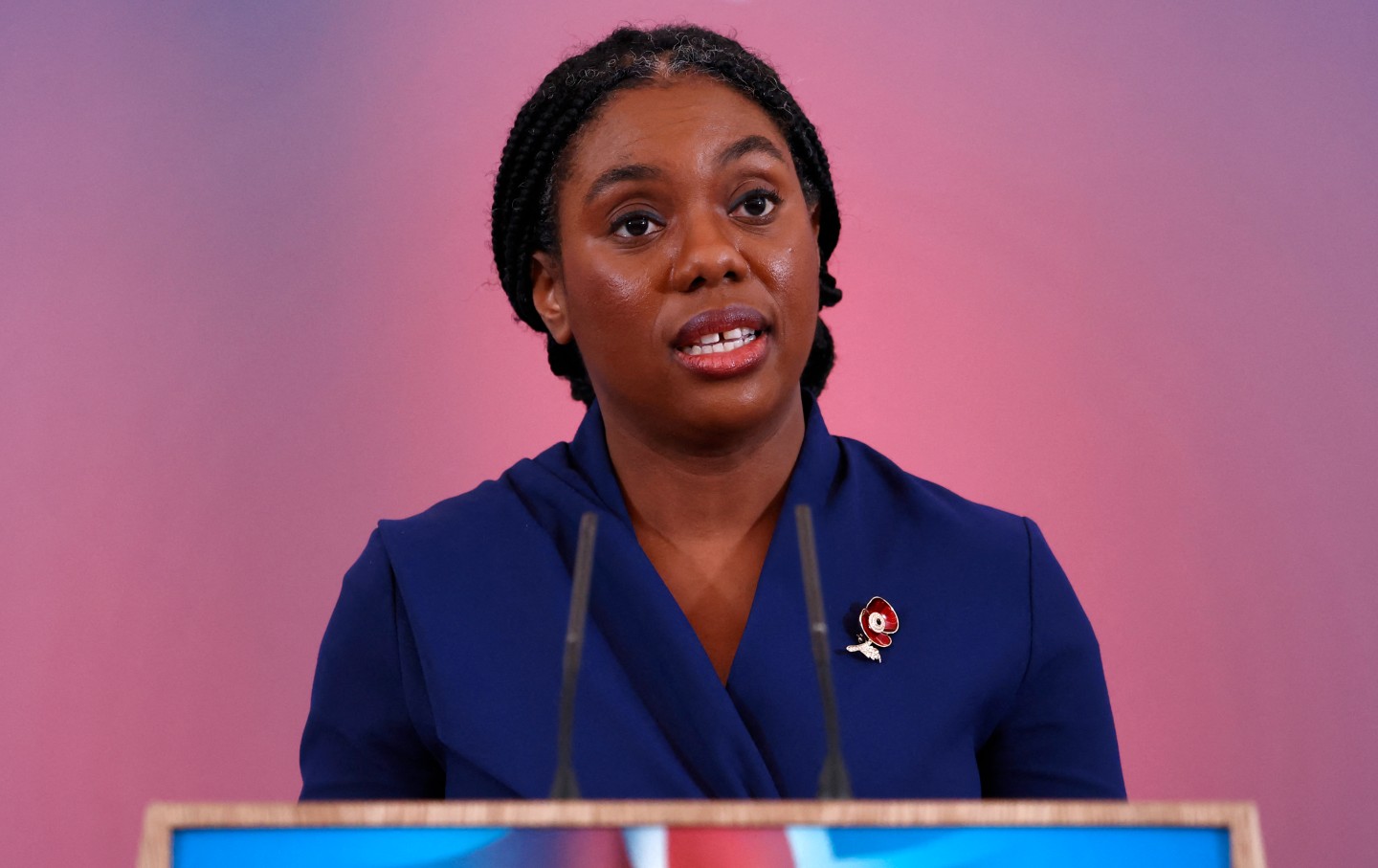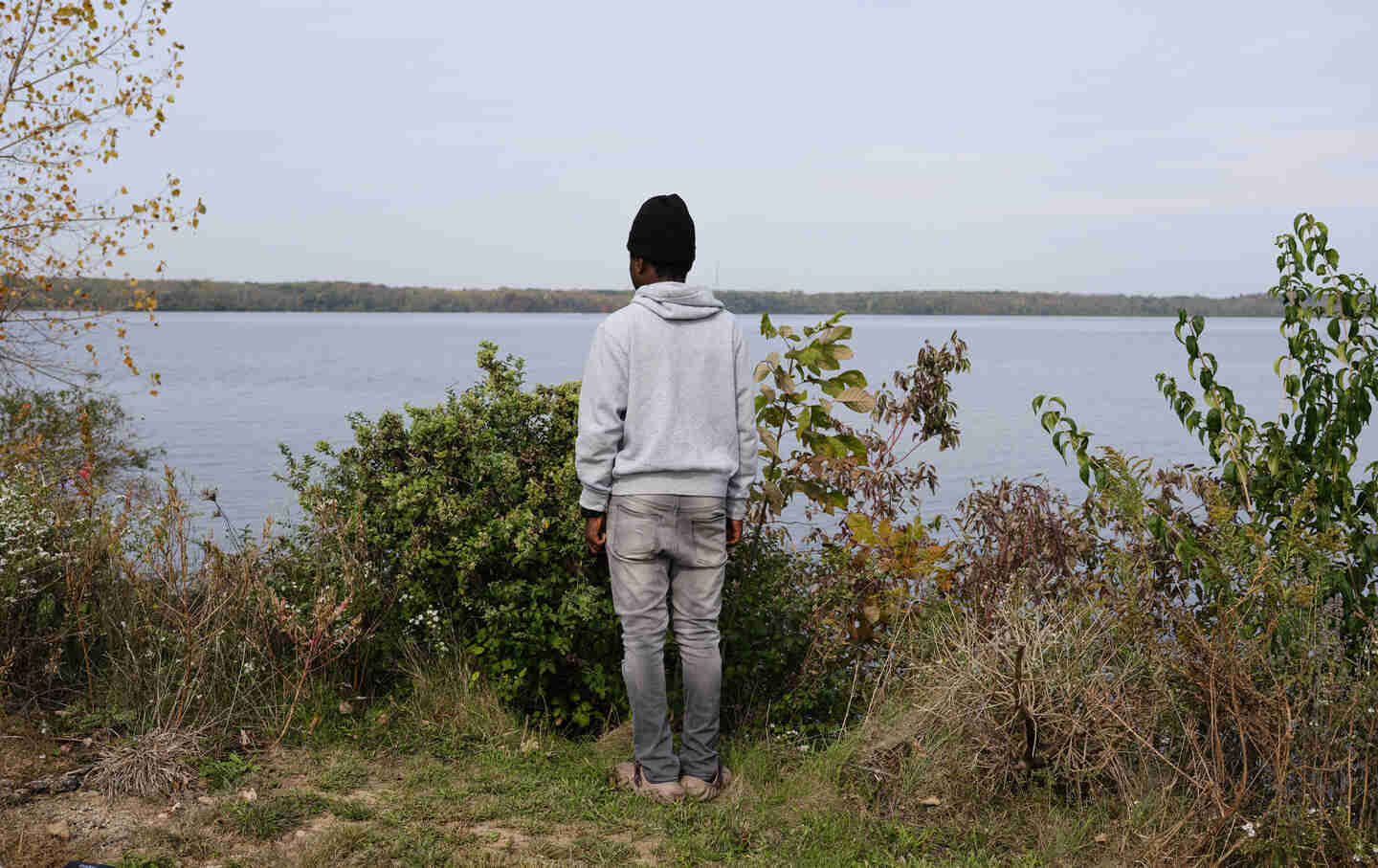The London-born daughter of Nigerians presides over the ruins of 14 years of Tory rule. Can her brand of nativism-lite lead the party out of the desert?

Lwave-In December 2006 – a year into David Cameron’s tenure as leader of Her Majesty’s most loyal opposition – Kemi Adegoke, a 26-year-old computer systems analyst at a bank, contributed to The observer magazine about why it was”it’s cool to be conservative.” Admitting that as a “black African woman” she may “not fit the image” of the “stereotypical” Tory party member, Adegoke, who moved to the UK a decade ago after growing up in Lagos, Nigeria, told a reporter she didn’t think “Every problem in the country it comes down to (Tony) Blair and the Labor Party.’ She simply believed that “the Conservatives would do a much better job of running the country.”
Now Kemi Badenoch, married to a banker she met as a young Conservative activist, is the MP for North West Essex and leads a party that was unceremoniously ousted in July this year after 14 years in government. In a selection process, fewer than 100,000 dues-paying Tory supporters voted on who should replace former prime minister Rishi Sunak as party leader, the former business secretary defeated former immigration secretary Robert Jerrick-also on the right wing of the Tories – to become the sixth leader in nine years.
Over the past century, almost every Conservative leader has served as prime minister at some point – except for a few brief years at the height of New Labor at the turn of this century, when the party faithful chose three unforgettable bald middle-aged men in rapid succession. If Badenoch, a combative communicator of conservative values, is to avoid their fate, her party must recover from its worst general election result in its history, reduced to 121 out of 650 seats in the House of Commons.
Since 2010, only two of the five Tory prime ministers have won a clear majority at the polls: Cameron and Boris Johnson – both Old Etonians and both Oxford University Fellows Bullingdon Cluban elitist all-male society known for its expensive uniforms and tendency to vandalize restaurants. Badenoch, who worked shifts at McDonald’s while studying at a further education college, is cut from a different cloth, although as equalities secretary under Johnson she first rose to prominence by embroiling herself in public spats over single-sex restrooms and the contested legacy of the British Empire.
When Johnson was ousted as prime minister by his peers in parliament in July 2022, with the party mired in corruption and sex scandals, Badenoch ran to succeed him. She has performed better than expected in a culture war that has included everything from “identity politics” to “net zero” and “The Ben and Jerry’s trend» in business to social justice — became a target.
After Badenoch was kicked out of the race, some of her supporters defected to the victorious campaign of Liz Truss, whose chaotic premiership ended abruptly just seven weeks after she alienated her cabinet and pound collapsed. She was hastily replaced by Sunak – the richest member of parliament, richer even than the king— without consultation with the party ranks. “We have to be honest — honest about the mistakes we made,” the new leader said conceded during her victory speech on Saturday, “spoke frankly about the fact that we don’t allow standards.”
Since the summer, the opposition Tory party has carried out little analysis, with its MPs engaged in factional positioning, which led to them eventually shortlisting two right-wing populist candidates. Although vestiges of liberalism have barely troubled the party leadership since Margaret Thatcher’s first term—during which she successfully distanced herself from the cabinet’s “Wets” who opposed her tough socioeconomic agenda—every time there is a contest, Britain’s chattering classes yearn for an alleged ‘United Nation’ candidate (the phrase comes from the Prime Minister of Victoria, Benjamin Disraeli, who has a there will be a plausible claim to rule as a ‘one nation’ Tory – a ‘moderate’ option for the Tory electorate Failure to do so during the last campaign, after far-right violence and racist riots erupting across the country have led to muted mainstream media interest, offering the remaining candidates an opportunity to appeal directly to their constituents’ baser instincts on immigration.
Just weeks after mosques and migrant hostels were targeted by racist vandals, Baden announced that Britain is “not a dormitory for people to come here and make money”, adding that “not all cultures are equally valid” when deciding who is allowed in and who is not. Her opponent, Jerrick, who once commissioned a Disney mural at an unaccompanied minors petition processing center painted over for being too hospitable – claimed that his country’s former colonies owed it a “debt of gratitude” and that anyone shouting “Allahu Akbar” in the street should be immediately arrested.
The proximate cause of the Conservative Party’s descent into nativist rhetoric is simple: the success of Nigel Farage. The Reform Party leader disrupted elections and exerted an ideological influence on the Tories during their last spell in government, finally gaining a foothold in parliament in 2024 as the MP for Clacton in Essex. Depriving his rivals of five seats and millions of votes, Farage…dubbed “Mr. Brexit” by Donald Trump– He will be glad that in recent years iconoclastic anti-immigrant right-wing parties have appeared in EU countries, such as France, Italy, Austria and the Netherlands. overtake the traditional conservative parties in the national elections. Badenach will inevitably face calls to “unite the right” around policies that prescribe strong borders and “war on the weekdays”. If she succeeds, the world’s oldest political party will be reduced to a mid-Atlantic Trumpist act floating somewhere between Republican America and mainland Europe.
How the Conservative Party, facing a cautious Labor government under Sir Keir Starmer, will spend its time in opposition remains to be seen. Those who study British political history know that even after large-scale national ruptures—from the repeal of the Corn Laws to Irish self-government, from Hitler’s appeasement to Brexit—the Tories are more than capable of adapting to new realities. Although their parliamentary stake has shrunk a bit, extra-parliamentary change can be effected by a robust ecosystem of extractive business interests, secretive think tanks and reactionary press barons, the latest of which is Sir Paul Marshall.
Hedge fund tycoon — whose satellite TV channel GB News to broadcast the only one-on-one debate between the Conservative leadership candidates, with Nigel Farage and a number of Tory MPs also working for the network – Marshall recently acquired Spectatorprint magazine, where Kemi Bodenock served as director of digital publishing less than a decade ago. Michael Gove, a former Machiavelli cabinet minister who praised the new leader’s “no-nonsense” approach and was seen by many as her political mentor, had just been appointed editor of an internal Tory journal of two centuries ago, p Charles Moore(official biographer of Margaret Thatcher, elevated under Boris Johnson) installed as chairman.
British conservatism, armed with a clear ideological theses, two viable parliamentary mechanisms and friends in high places, could embark on its boldest transformation since Thatcher became opposition leader 50 years ago.
Editor’s note: Due to an editing error, an earlier version of this story stated that Ms. Badenock was born in Nigeria. She was actually born in Wimbledon, South West London. Nation sorry for the mistake.
We cannot retreat
We now face a second Trump presidency.
There is nothing to lose. We must use our fears, our grief, and yes, our anger to oppose the dangerous policies that Donald Trump is unleashing on our country. We rededicate ourselves to our role as principled and honest journalists and authors.
Today we are also preparing for the future struggle. It will require a fearless spirit, an informed mind, wise analysis and humane resistance. We are faced with the adoption of Project 2025, a far-right Supreme Court, political authoritarianism, rising inequality and record homelessness, a looming climate crisis and conflicts abroad. Nation will expose and propose, develop investigative reporting and act together as a community to preserve hope and opportunity. NationThe work will continue — as it has in good times and bad — to develop alternative ideas and visions, to deepen our mission of truth-telling and in-depth reporting, and to expand solidarity in a divided nation.
Armed with 160 years of courageous independent journalism, our mandate remains the same today as it was when the Abolitionists were founded Nation— to defend the principles of democracy and freedom, to serve as a beacon in the darkest days of resistance, and to see and fight for a bright future.
The day is dark, the forces are building tenaciously, but it’s too late Nation editorial board member Toni Morrison wrote “No! This is just the time when artists go to work. No time for despair, no room for self-pity, no need for silence, no room for fear. We speak, we write, we make language. This is how civilizations heal.”
I encourage you to support Nation and donate today.
next,
Katrina Vanden Heuvel
Editorial Director and Publisher, Nation
More from Nation

Ukrainian officials maintain an upbeat, bipartisan approach to the US, but privately many Ukrainians are pessimistic about the increasingly grim war and the US role in it.

For those trapped in northern Gaza, Israel’s “Surrender or Starve” policy means the possibility of death in one way or another at any moment.




